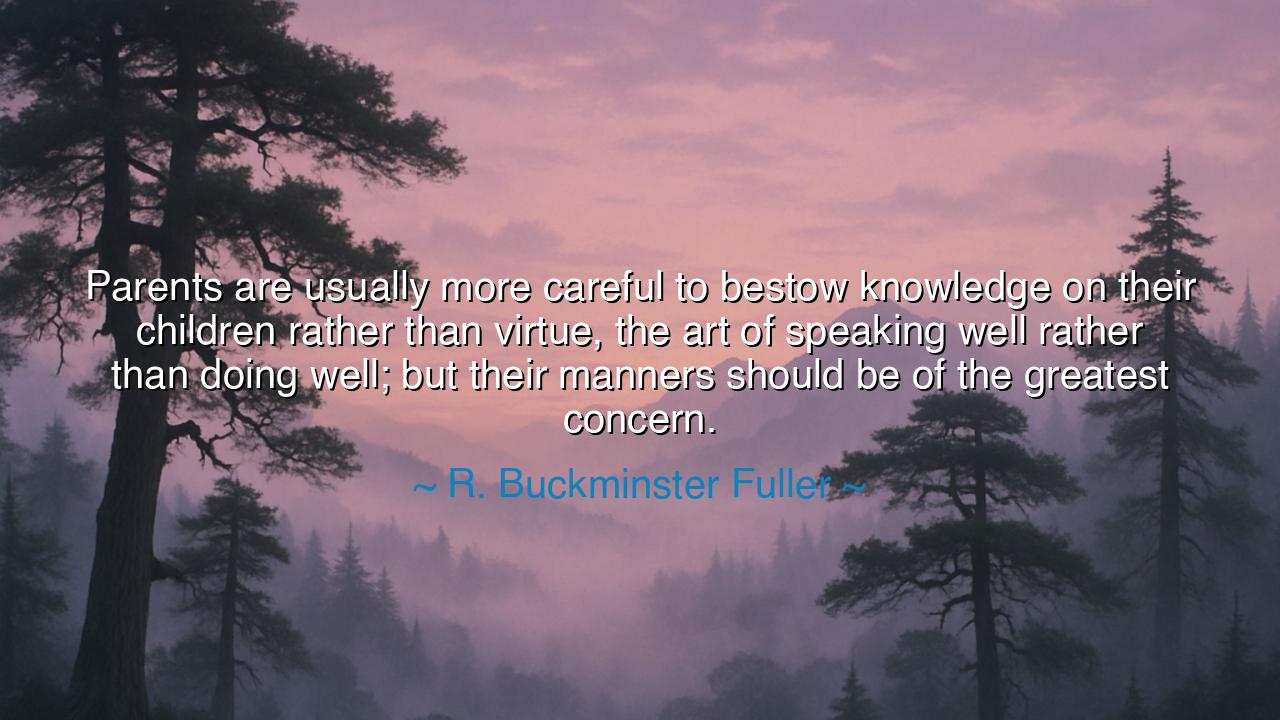
Parents are usually more careful to bestow knowledge on their
Parents are usually more careful to bestow knowledge on their children rather than virtue, the art of speaking well rather than doing well; but their manners should be of the greatest concern.






The philosopher and visionary R. Buckminster Fuller, a man who looked upon the world as both inventor and prophet, once declared: “Parents are usually more careful to bestow knowledge on their children rather than virtue, the art of speaking well rather than doing well; but their manners should be of the greatest concern.” In this single sentence, he exposes a wound at the heart of modern civilization—the loss of moral cultivation beneath the glitter of intelligence. He saw that in the race to make our children clever, we have forgotten to make them good; that we have prized eloquence above integrity, and ambition above humility. Yet the fate of humanity, he warns, depends not upon how well we know, but how rightly we live.
Fuller, who lived in the twentieth century but thought like a sage of the ancients, understood that knowledge without virtue is like a ship with no compass—it can sail far, but not rightly. In an age that worshipped technology, he dared to remind the world that progress without goodness becomes destruction. His quote echoes the wisdom of philosophers past—of Socrates, who said that knowledge divorced from virtue corrupts the soul; of Confucius, who taught that the gentleman cultivates morality before scholarship. Fuller saw that though we fill the minds of our children with facts, we leave their hearts empty of purpose. We teach them to speak, but not to listen; to win, but not to serve; to shine, but not to love.
It is a tragedy both old and new. In the ancient world, the great city of Athens prided itself on producing masters of rhetoric—men who could move crowds with words. Yet it was this very art of speaking well that doomed Socrates, for the city had learned to admire eloquence more than truth. They could persuade, but they could not discern. Thus Fuller’s warning reaches across centuries: eloquence without virtue is a weapon, and knowledge without character is perilous. What, after all, is the worth of a brilliant mind if it serves a dark heart?
There is a story told of a mother in ancient Rome who brought her son to a philosopher, asking him to teach the boy wisdom. “Feed him not on words,” the sage replied, “but on deeds.” The mother obeyed, and every morning they worked among the poor, helping those in need. When the boy returned years later, he spoke little but lived greatly. His actions became his speech, his humility his eloquence. Such a story mirrors Fuller’s own wisdom—that the finest education is not in schools, but in example; not in lectures, but in the life of those who raise us. For children learn more from what their parents are than from what they say.
Fuller’s life itself was a testament to this principle. Though he was a designer and engineer, he never saw invention as separate from morality. Every creation, he believed, should serve humanity, not enslave it. He taught that genius ungoverned by virtue becomes tyranny, and that the ultimate test of intelligence is compassion. Thus, his warning to parents is not merely about upbringing—it is about the survival of civilization itself. For a world full of knowledge but empty of conscience will one day devour itself.
O listener, take heed of this wisdom: Do not raise your children to be clever; raise them to be kind. Do not praise them for their speech until you have guided their deeds. Teach them that manners, compassion, and self-discipline are greater than wit or eloquence. For the tongue may charm, but only the heart endures. Let them see in you the virtue you wish them to learn—patience, honesty, humility—for what they behold in your life will shape their own. As fire is kindled by flame, so virtue is passed by example.
In every home, then, let virtue be the foundation, and knowledge its adornment. Teach your children to think, yes—but more than that, teach them to feel rightly, to act justly, to live truthfully. Let them learn that wisdom is not in knowing everything, but in doing good even when no one sees. When manners—that is, the grace of the spirit made visible—guide their actions, they will carry peace wherever they go.
And remember Fuller’s eternal counsel: knowledge may build a world, but only virtue can preserve it. Let your legacy, therefore, be not merely the brilliance of your children’s minds, but the goodness of their souls. For it is virtue, not intellect, that makes humanity divine; and it is goodness, not greatness, that gives life its light.






AAdministratorAdministrator
Welcome, honored guests. Please leave a comment, we will respond soon